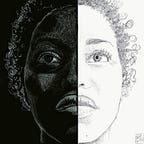Buried Leads: Culture Change — Preventable Hardship in the United States
By: Crystallee Crain
I’m concerned about the invisibility of preventable hardship that occurs when we embody the status quo as a comfort.
While the term — preventable hardship — is not widely known it is easy to comprehend. Some personal difficulties can be prevented through social and cultural change. In this context, I’m focusing on the hardships caused by social conditions that are not in an individual’s control.
In American society personal hardship is often defined as a personal failure. Social conditions like a pandemic, for instance, or the ever-present level of racial and gender injustice in our system.
Rampant and oftentimes legal housing discrimination, over-policing, poor education, and lack of health care are just a few social conditions that perpetuate certain people from experiencing certain types of preventable hardships. These conditions were created by people therefore they can be changed by people.
Our collective confusion on whether or not we should respect the man on the street corner asking for help with at least a smile often doesn’t jump to understanding the discriminatory housing policies that put him there. What would make his suffering acceptable to you in order for you to see his humanity and help him? Or even better yet, vote in ways that elect people who make decisions through a lens of collective liberation.
It doesn’t help that we are socialized to believe that if you work hard you will have what you need in life. This is not true. It can only be factual if the social conditions, created by human inaction, are addressed so they don’t cause preventable hardships for people that limit their life chances.
It’s not as if all problems can be solved, even within a generation, it’s more about how we choose to be as a people — a nation — with multiple identities and realities.
There is an unspoken cultural element in the U.S. that makes the deserving poor the ideal candidate for support or even to advocate for when conjuring a solution.
This cultural illusion pits people against themselves and others in an effort to thrive socially. Overworked and underpaid is a mantra for our young and increasingly, for most.
In our “economy” most people see their role as employees and consumers shifting and changing weekly — sometimes daily. People are beholden to a paycheck and it defines our life chances.
Our values are warped as our integrity as a human is based on what we can attain not who we build ourselves to be, individually and as a community.
In 2015, PBS did a story on the ways in which the zip code we are born in can have a huge impact on your life chances.
The notion itself is astonishing considering the way the raw stench entitlement seeps into most conversations about the “haves and the have nots.”
The piercing violation on the removal of life chances, based on the geography of your birth, is a direct result of institutionalized racism, sexism, and capitalistic gain being prioritized over people.
In the United States, we have the highest rates of income disparities for a developed nation. This term defines income distribution and access to education, health care, and a livable built environment.
I propose a few new questions for a us to consider as we work to create more equity and a society where all people can thrive to their highest potential.
Different types of questions
How might we create a world where preventable hardships no longer define a person’s existence?
How might use the time we have an opportunity to re-organize our society to meet the needs of the most amount of people?
How might we re-imagine an educational system that is focused on fostering the depth of an individuals experience?
How might we include collective liberation and a deeper consciousness in the way we choose to lead and heal our communities?
How might we employ a culture of healing for ourselves and our respective communities?
You can learn more about the author at www.crystalleecrain.org.
